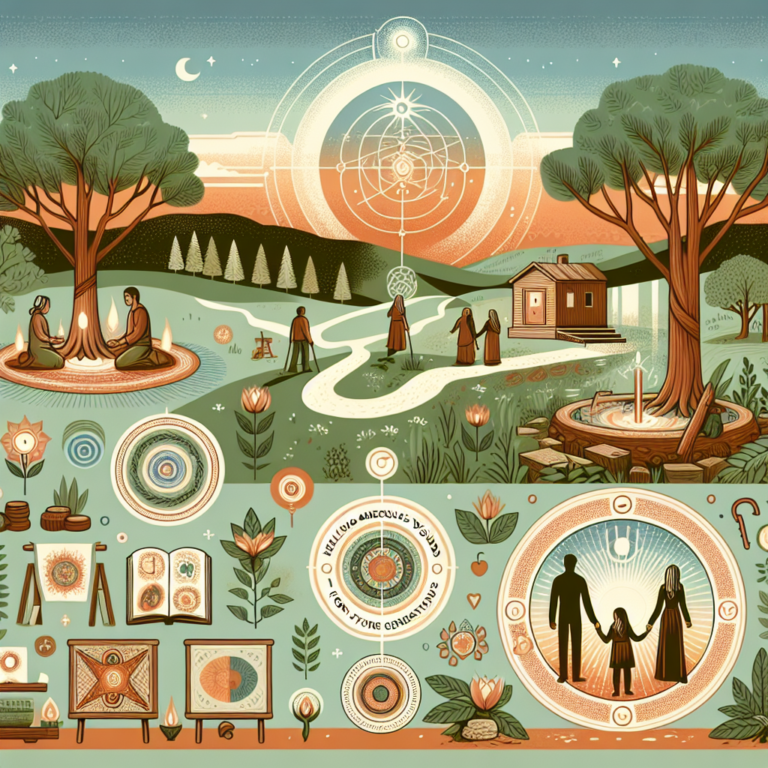In a world interconnected by thoughts, actions, and emotions, the concept of karma plays a significant role in shaping not only our experiences but also our relationships with others. The laws of karma transcend religious or spiritual beliefs; they serve as reminders that every action we take reverberates throughout our lives, echoing in the lives of those around us. Understanding this connection fosters healthier, more meaningful relationships, as we begin to appreciate that our choices have real implications for ourselves and others.
Understanding Karma
The term "karma" originates from the Sanskrit word "karman," meaning "action" or "deed." In essence, karma refers to the idea that actions—be they good, bad, or neutral—carry consequences. This is not merely a cause-and-effect relationship but an intricate web woven with intention, energy, and consciousness. While the popular notion of karma often emphasizes retribution (good actions yielding good results and bad actions yielding bad results), the reality is more nuanced. It is about alignment—how our actions resonate with our values and how they impact our communities.
The Ripple Effect of Actions
Every action we take has the potential to create a ripple effect. Imagine throwing a stone into a still pond; the ripples expand outward, affecting everything in their path. In relationships, our actions don’t exist in isolation. They influence how others perceive us, how they respond to us, and ultimately how they interact with others.
For instance, consider a workplace scenario: if one employee goes out of their way to help a colleague meet a tight deadline, that act of kindness may inspire camaraderie and a willingness to collaborate on future projects. Conversely, if an individual behaves selfishly or speaks harshly, it can lead to distrust, gossip, or a toxic environment that erodes team spirit. Thus, understanding the ripple effect of our actions encourages mindfulness and intentionality in our interactions—key ingredients for healthy relationships.
The Role of Intention
Intention is a fundamental aspect of karma. Actions taken with genuine positive intent cultivate goodwill and deeper connections. When we approach relationships with kindness, empathy, and understanding, we nurture an environment of safety and support. Take, for example, the small acts of kindness we engage in daily—offering compliments, lending a listening ear, or providing assistance. These seemingly insignificant gestures accumulate over time, forging bonds that can sustain us through life’s challenges.
However, if our actions are driven by self-interest or are rooted in negativity, they can lead to conflict, resentment, and distance. For instance, if we enter a relationship primarily seeking personal gain without considering the feelings and needs of the other person, friction is likely to arise.
Self-Reflection and Accountability
Understanding the karma connection in relationships also involves self-reflection and personal accountability. It’s essential to take a step back and examine not only our actions but also our motives and the patterns that emerge from them. This process can reveal deeply ingrained behavioral tendencies that affect how we interact with others.
By establishing a practice of self-reflection, whether through journaling, meditation, or talking with trusted friends or mentors, we can identify areas for growth. For example, do we often find ourselves in conflict? If so, is there a common denominator in our relationships? Are we projecting our issues onto others? Taking accountability for our actions requires courage but ultimately leads to growth, understanding, and healthier dynamics.
The Transformative Power of Forgiveness
A significant aspect of karma in relationships is forgiveness—both extending it to others and ourselves. Holding onto grudges and past grievances can weigh heavily on our minds and hearts, affecting how we relate to those around us. Forgiveness does not mean condoning negative actions; instead, it’s about liberating ourselves from the shackles of pain that others may have imposed upon us.
When we embrace forgiveness, we not only mend fences but also contribute to a cycle of positive karma. Our willingness to let go of negativity often inspires those around us to do the same, fostering a culture of understanding and compassion. This fosters resilience in relationships, allowing them to survive and thrive even after conflicts.
Building a Positive Karma Framework
To ensure that your actions contribute positively to your relationships, consider the following frameworks:
Act with Intent: Before taking an action, ask yourself, "What is my intention here?" Try to act with compassion and respect.
Be Mindful: Cultivate mindfulness to help tune into your feelings and those of others, promoting sensitivity in your interactions.
Communicate Openly: Promote transparency and honesty in your relationships; clear communication diminishes misunderstandings that can lead to negative karma.
Practice Empathy: Develop the ability to see things from another’s perspective, allowing you to respond thoughtfully rather than reactively.
Create Accountability: Establish a system for reflecting on your actions, whether it be through self-reflection, discussions with friends, or formal therapy.
- Embrace Forgiveness: Let go of grudges and resentment to create space for renewed connections and healthier interactions moving forward.
Conclusion
Understanding the karma connection empowers us to take charge of our relationships and our lives. An increased awareness of how our actions affect ourselves and others can unlock the potential for deeper, more meaningful connections. Recognizing the ripple effect of our actions encourages us to be more intentional, empathetic, and forgiving, ultimately nurturing a community built on respect, understanding, and love.
As we navigate our journey in relationships, let us carry the notion of karma with us, using it as a guide to shape not only our actions but also the future we wish to create for ourselves and the people we hold dear.
FAQs
1. What is karma in the context of relationships?
Karma in relationships refers to the idea that our actions—both good and bad—carry consequences that affect our interactions with others. It emphasizes the interconnectedness of our behavior and the impact it has on our relationships.
2. How can I cultivate positive karma in my relationships?
You can cultivate positive karma by acting with genuine intent, practicing mindfulness, communicating openly, showing empathy, creating accountability for your actions, and embracing forgiveness when needed.
3. What role does intention play in karma?
Intention is crucial because it determines the energy behind our actions. Positive intentions lead to positive outcomes, while negative intentions can foster resentment and conflict. Understanding our intentions can help us navigate our relationships more thoughtfully.
4. How does self-reflection contribute to positive karma?
Self-reflection allows us to examine our behaviors and their impact on our relationships, helping us recognize patterns and areas for improvement. Accountability helps us grow and enhances our interactions with others.
5. Why is forgiveness important in understanding karma in relationships?
Forgiveness is vital because it helps release negative emotions tied to past grievances, enabling healing and nurturing stronger bonds. It creates a cycle of positive karma that encourages resilience and support in relationships.
Sure! What would you like to know or discuss? If you have a specific topic or prompt in mind, feel free to share it!, #Karma #Connection #Actions #Shape #Relationships, #Karma #Connection #Actions #Shape #Relationships, 1734308533, the-karma-connection-how-your-actions-shape-your-relationships





